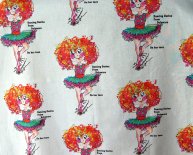
Cotton Knit Print fabric
 Most people who buy fabric online purchase it through one of the established shops like Pink Castle, Hawthorne Threads, or Fat Quarter Shop. There’s a segment of the fabric buying public, though that purchases fabric through private Facebook groups. As these groups grow in size and popularity, their impact on the more mainstream stores increases.
Most people who buy fabric online purchase it through one of the established shops like Pink Castle, Hawthorne Threads, or Fat Quarter Shop. There’s a segment of the fabric buying public, though that purchases fabric through private Facebook groups. As these groups grow in size and popularity, their impact on the more mainstream stores increases.
I wanted to investigate how the Facebook fabric groups work as businesses, find out why customers are shopping this way, and then analyze the possible long-term impact they might have on the online sewing community.
From what I can tell there are two main types of fabric that are currently being sold through private Facebook groups. The first is premier quilting cottons from the big name manufacturers. The second is custom knits.
“It’s actually an accident that it came to be, ” Breanne explains. “I started off selling handmade clothes and started Mama Made and Beautiful just to sell off some extras. It became really popular really quick and sort of took on a life of its own.”
 Right now Mama Made and Beautiful has 5, 950 members and Breanne says her fabric shop is a business like any other. She’s hired an employee to help her with cutting and shipping and this fall she traveled to Quilt Market to order new fabrics for her shop.
Right now Mama Made and Beautiful has 5, 950 members and Breanne says her fabric shop is a business like any other. She’s hired an employee to help her with cutting and shipping and this fall she traveled to Quilt Market to order new fabrics for her shop.
The prices at Mama Made and Beautiful are lower across the board than a typical online fabric shop. A yard of Gleeful by Sew Caroline for Art Gallery fabrics which sells for $10.75 from Fat Quarter Shop is just $8.75 at Mama Made and Beautiful. Breanne takes pre-orders for much of her fabric, selling off the bolt in advance of buying it. When she uploads new fabrics for pre-order they sell out fast.
The discount prices Breanne and other Facebook group owners offer can rub the owners of online quilt shops the wrong way. Quilt shop owners tend to feel that manufacturers should not sell to shops that are organized as “coops.” (Coops are defined as groups of customers that get together and order bulk fabric at wholesale prices, then divvy it up.) Manufacturers claim to agree, saying that if they find out that a shop is a coop they won’t sell to them.
For the most part, though, fabric isn’t sold directly by the manufacturers. Instead it’s sold through independent sales companies working as middlemen between manufacturers and retailers. The salesmen, known as fabric reps, work on commission and often have no problem selling fabric to the owners of Facebook groups.

















